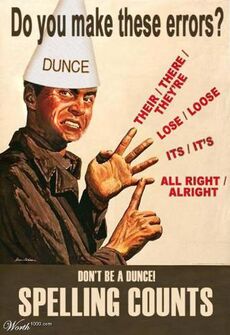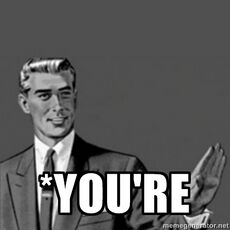- Portals
- The Current Year
- ED in the News
- Admins
- Help ED Rebuild
- Archive
- ED Bookmarklet
- Donate Bitcoin
Contact an admin on Discord or EDF if you want an account. Also fuck bots.
There, Their, and They're
Quite possibly the most difficult homophone trio to master, their misuse is widespread on the internets. Most uneducated users posting on forums and YouTube not only have no idea when to use which one, but most can't even spell them properly.


There
Probably the most abused of the three. There is a contraction to be used wherever you could possibly use the words they are as a substitute. If you don't take the time to check this, you are either 10 years old and under the incorrect impression that you are so clever because you know there are several forms of the word, a butthurt monkey, or simply lazy. Were you truly lazy you would only use their for everything.
Examples:
- There making fun of your tiny dick.
- There thrusting their penis in and out of your asshole.
- There going to the whorehouse to get a piece of your mom.
Their
The least improperly utilized of the three, but when its use is required most use another form instead. Their is in fact used when describing a location, when pointing out an object, or simply if you don't know which to use using this will least likely result in you getting mocked.
Examples:
- Their is your tiny dick.
- Their are several erect penises up your asshole.
- Their goes your mom to the whorehouse again.
They're
Retardedly following the confusing and often contradicted rule of English grammar: "I before E except after C," which no one has yet learned in language class. The word they're is in fact spelled T-H-E-Y-'-R-E, not actually involving a C. They're is used when declaring ownership, either yours or a that of a third party.
Examples:
- They're dicks are tiny.
- They're erect penises are up your ass.
- They're mom sees your mom going to the whorehouse.
See also
| There, Their, and They're is part of a series on Language & Communication | |
|---|---|
Languages and Dialects • Grammar, Punctuation, Spelling, Style, and Usage • Rhetorical Strategies • Poetry •
The Politics of Language and Communication • Media • Visual Rhetoric
Click topics to expand |

|